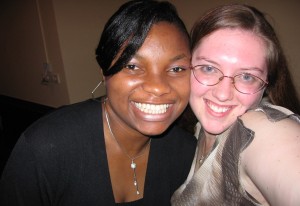I recently wrote about my experiences at FIGT 2019 in Bangkok (the annual Families in Global Transition conference).
At the conference I presented a “lightning” talk – something like a short TED talk, lasting six minutes. I was fortunate to be the first of eight talks – fortunate because then it was out of the way, leaving me able to really listen to the rest. There were so many great talks, with a range of subjects and styles. One was a highlight of the whole conference, and received a standing ovation!

If you are a member of FIGT, I believe video of all eight talks will be available on the FIGT website soon (other resources are already there). If you aren’t a member, I really suggest looking into it. In addition to the great annual conference, there are lots of excellent resources and networking opportunities in the FIGT community year-round.
But back to my talk. I spoke about relationships with place: our complicated feelings about the places we connect with, and using the language of love to explain it. The rest of this post is a script that’s pretty close to what I actually said on the day, with some pretty pictures I chose to go along with my story.

Two years ago at FIGT in the Netherlands, we were asked to stand and gather in answer to certain questions – like, “who travelled here from Australia?” It was a great community building exercise, finding people we had things in common with. And it was a lot of fun! Until someone asked the question: “who fell in love this year?”
Well, I had.
Two weeks earlier I had decided to move to Beijing at the end of that year, to be with my boyfriend. It was still new to me, but despite how vulnerable it made me feel, I decided to stand up. There were two of us up there, while the whole FIGT community clapped and cheered. And suddenly my long distance relationship felt a lot more real!
I had no idea at the time, but a year later I would be living in Beijing with my now husband.

We had an engagement party in Australia, a wedding in the US, and a reception in China. And, as I’m sure you can imagine, our story is much more complicated than that!
Relationships are complicated. Our emotions and experiences and interactions are complex.
We have so much vocabulary to help us describe different kinds of relationships we experience – especially the range of romantic relationships.

We talk of love at first sight, falling in love, falling out of love, unrequited love.
There are flings, whirlwind romances, friends with benefits, long-distance relationships, polyamorous relationships.
There are even toxic relationships, loveless marriages, and affairs.
There are commitments without weddings, and even weddings without much commitment.
There are first dates, anniversaries, and break ups.

Today I would like to suggest that this rich vocabulary we use to describe relationships between people can be used to better express our multi-layered connections to places.
But first, let’s take a moment to feel some of those complex feelings we have about people.
Think of someone you love…

What feelings arise when you think of them?
Does a smile come to your lips?
Do you feel warm, or happy, or thankful?
But then again, maybe you haven’t seen or even talked to them for a while.
Perhaps you fought recently.
Maybe you’re missing them today.
Now think of someone you were close to a long time ago, but haven’t talked to in years…

What feelings arise when you think of them?
Does a smile come to your lips?
Is there sadness over losing touch with them?
Or perhaps nostalgia for a part of your life now in the past?
Finally, think of someone you love dearly, but live far away from…

What feelings arise when you think of them? Does a smile come to your lips?
Is there pain at the geography that separates you?
Is there guilt over choices you’ve made that keep you apart?
Our relationships with people are complicated. So are our relationships with places.

And the reality is that we DO have relationships with places – emotional and legal relationships. So, what if we allow ourselves to use the emotional vocabulary of love and human relationships to describe our complex feelings about places?
Perhaps we will find clarity and comfort.
Perhaps we will gain ways to articulate why we feel what we feel.

Now, I’m certainly not the first person to draw this connection.
Amy Medina wrote that living in a country where she is not (and cannot be) a citizen is like falling in love “with something that I can’t keep.”
Mariam Ottimofiore wrote something similar in her “break up letter” to Dubai – that living there was like falling in love with someone not looking for commitment. As she put it: “Nothing serious, please.”
(Later I also came across a piece by Dana Saxon in which she described “falling out of love” with a place.)

They both helped give words to something I have heard from so many TCKs over the years, and I subsequently wrote a blog post about “unrequited love of place” – about feeling a deep emotional connection to a country in which you have no legal rights.
No guarantee you can stay.
No right to return.

Many expats and TCKs told me this was the first time they’d been given words to express how they felt. They passed my blog post on to friends and family, to help them understand an experience they’d never been able to explain before.
And THIS is what the language of love gives us – a way to articulate and SHARE the emotions we feel about places.

“Unrequited love” describes one type of relationship to place, but there is an endless variety of ways to apply this concept.
For example, have you experienced “love at first sight” with a place? You arrive for the first time and something about that city, that country, speaks to your soul in a way you can’t intellectually explain. That was Bangkok for me, on one of my visits.

Have you experienced the slow burn of falling in love with a place gradually over time, as its idiosyncrasies become familiar and comforting, and you become fond of its foibles?
Have you had a fling, or a holiday romance? A short and intense experience of a country that becomes a fond memory, but not a long term commitment.

Have you had a long-distance relationship with a place? Somewhere very close to your heart, often in your thoughts, but not where you live right now?
Have you experienced managing that distance, through visits and finding ways of connecting from far away?

Have you experienced the sting of rejection, when a place you love does not return your desire for commitment? A visa renewal not accepted. A citizenship application rejected.
Have you experienced the slow loss of love, as you change, and the place you loved changes? The relationship you have changes and you fall out of love.

Perhaps living in a country you don’t love, don’t feel that emotional connection to, could be compared to a loveless marriage, an every day loneliness due to lack of love for a place you are committed to.
Have you experienced a casual relationship with a place – you visit and enjoy it, but there’s no commitment on either side. Friends with benefits, perhaps?

The complicated love of holding multiple passports might compare to a polyamorous relationship – you can be committed to more than one place, just as you can be committed to more than one person, but that doesn’t mean everyone understands just how you make it work.

We connect deeply with places in which we live. We bond with places we visit.
But, as facebook might say, it’s complicated.
The language of love is powerful, and commandeering this language to describe our relationships with places gives us a powerful tool – one I hope you will very much enjoy using!
I love love love this – thank you 💜
LikeLiked by 1 person
I’m so glad!!!
LikeLiked by 1 person
Great post :)
LikeLiked by 1 person
Thanks! Glad you liked it :)
LikeLike
No problem 🙂 check out my blog when you get the chance 😄
LikeLike
Pingback: Unrequited love of place | MISUNDERSTOOD